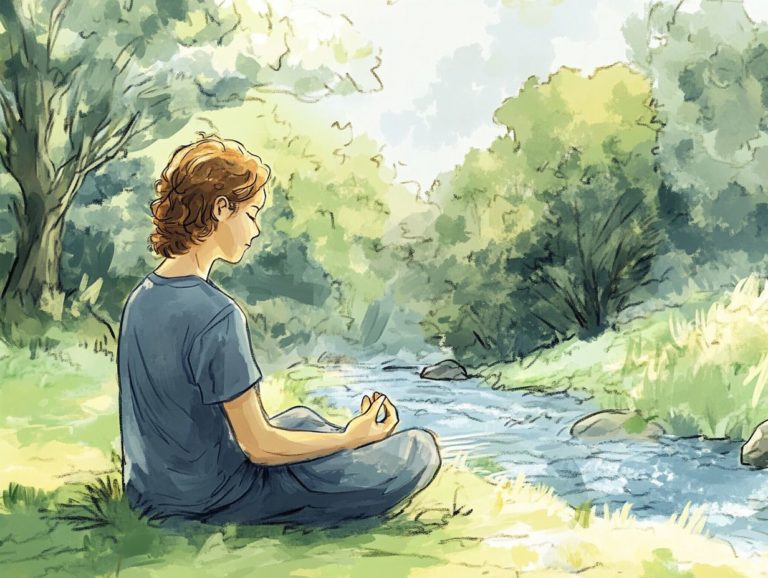10 Stress-Busting Activities for Families
In today’s fast-paced world, you may find yourself balancing a multitude of responsibilities, which can lead to increased stress and a decrease in meaningful quality time with your family. Effective stress management methods are essential to maintaining emotional strength and a good social network.
Fortunately, there are numerous ways for you to reconnect and unwind as a unit. This article delves into ten engaging activities designed to help your family de-stress, ranging from invigorating outdoor adventures and creative arts to whipping up delicious meals and enjoying lively game nights. Incorporating these family activities can provide much-needed stress relief and foster a positive outlook.
These bonding experiences not only help lower stress levels but also strengthen your relationships, fostering a healthier and happier family dynamic. Discover the benefits and practical tips for seamlessly integrating these activities into your busy lives, ensuring you have a good support network and effective coping mechanisms.
Contents
- Key Takeaways:
- 1. Outdoor Adventures
- 2. Family Game Night
- 3. Arts and Crafts
- 4. Cooking and Baking Together
- 5. Family Movie Night
- 6. Exercise and Physical Activities
- 7. Family Volunteer Work
- 8. Music and Dance Parties
- 9. Family Book Club
- 10. Relaxation Techniques
- Why Is It Important for Families to Manage Stress Together?
- What Are the Long-Term Effects of Unmanaged Stress on Families?
- Frequently Asked Questions
- What are some stress-busting activities that families can do together?
- Why are stress-busting activities important for families?
- Can stress-busting activities be done at home?
- Are there any benefits of doing physical activities as a family?
- How can I get my family to participate in stress-busting activities?
- Are there any stress-busting activities that also involve giving back to the community?
Key Takeaways:
1. Outdoor Adventures
Outdoor adventures present you and your family with a remarkable opportunity to bond while engaging with nature, all the while alleviating stress and enhancing emotional health. Activities such as hiking, biking, or even taking a leisurely stroll in the park provide not just physical exercise but also significant mental wellbeing.
The fresh air and picturesque landscapes offer a welcome escape from daily pressures, allowing you to reconnect with one another, promoting relaxation and a more positive outlook on life. Embracing outdoor activities serves as a powerful tool for building emotional resilience, nurturing healthy habits, and enhancing mental wellbeing within a supportive family dynamic.
These adventures allow your family to share experiences that create lasting memories, reinforcing your social network and support systems in the process. By incorporating relaxation techniques like deep breathing, guided imagery, or mindfulness exercises during these outings, you can elevate the entire experience.
For example, taking a moment to pause during a hike to immerse yourself in the sounds of nature or practicing mindful observation of your surroundings can deepen your appreciation for both the moment and each other. This harmonious blend of activity and relaxation not only boosts emotional well-being but also fosters a sense of community among everyone involved, making each adventure all the more enriching.
2. Family Game Night
Family game night is your ticket to strengthening bonds, enhancing communication, and effectively managing stress, all while indulging in a bit of fun and laughter.
These gatherings present the perfect opportunity for you and your family to dive into a variety of games that require collaboration and strategy, cultivating a sense of teamwork that transcends the game board.
For example, cooperative board games or team-based activities invite everyone to problem-solve together, fostering emotional resilience and encouraging open dialogue.
In this comfortable setting, you can express your thoughts and feelings freely, which significantly contributes to developing lasting communication skills. Creating a supportive environment where everyone feels enableed to participate and share their opinions elevates the experience, ensuring that family game night transforms into a cherished tradition that nurtures connection and joy.
3. Arts and Crafts
Engaging in arts and crafts is not just a delightful family pastime; it serves as a vibrant creative outlet that encourages relaxation and self-reflection. This significantly alleviates stress levels.
Through various projects, you can immerse yourself in creativity while enjoying the therapeutic benefits these activities provide. For children, simple tasks like finger painting or creating collages can ignite imaginative play and refine fine motor skills, nurturing their emotional well-being.
Teens and adults may find solace in more intricate crafts such as pottery or knitting. These activities allow them to channel their focus and cultivate a sense of accomplishment.
These creative pursuits offer a unique opportunity for family members to connect, fostering open communication and insight into each other’s thoughts and feelings. Ultimately, this contributes to a healthier emotional atmosphere and a more positive outlook on life.
4. Cooking and Baking Together
Cooking and baking together as a family can elevate meal preparation into a joyful experience. This relieves stress, encourages healthy eating habits, and nurtures meaningful connections.
This shared activity not only draws family members closer but also invites everyone to learn new skills together. As you chop fresh vegetables or knead dough, take a moment to revel in the enticing aromas wafting through the kitchen, cultivating an atmosphere of mindfulness.
Collaborating on recipes enhances your teamwork and communication skills, whether you’re deciding who adds the seasoning or who stirs the pot.
When you gather around the table to savor your culinary creation, it s the perfect opportunity to express gratitude for the abundance of food and the precious time spent together. This deepens your appreciation for both the meal and one another.
5. Family Movie Night
A family movie night offers an exceptional opportunity to unwind. It provides an enjoyable escape that encourages relaxation and fosters lasting memories, nurturing a positive outlook on life. This simple activity serves as an excellent form of stress relief and a coping mechanism for everyone involved.
This cherished tradition can be customized to accommodate various age groups think animated features for the little ones, engaging adventures for teens, and heartfelt dramas for adults.
After the credits roll, dive into thoughtful discussions, sharing your perspectives and feelings about the film. This exchange deepens connections among family members and acts as a crucial coping mechanism for stress, allowing you to navigate life’s challenges together.
By exploring themes such as love, resilience, and friendship collectively, you can strengthen your emotional well-being. This cultivates a supportive environment where every member feels valued and heard.
6. Exercise and Physical Activities

Incorporating exercise and physical activities into your family time is a powerful way to elevate endorphins, manage stress, and cultivate healthy habits that will last a lifetime. Regular exercise also contributes to emotional resilience and better stress management.
Imagine engaging in lively soccer matches at the local park or exploring nature trails during weekend hikes. Create unforgettable memories together while fostering teamwork and communication.
Cycling together or participating in a friendly game of basketball enhances your physical well-being and strengthens emotional bonds, making those shared experiences even more meaningful.
Such activities encourage both children and adults to adopt a more active lifestyle, effectively reducing anxiety and improving overall mood. These joyful moments spent outdoors reinforce positive connections, ensuring that family exercise transforms from mere routine into a cherished tradition that builds emotional strength over time.
7. Family Volunteer Work
Participating in family volunteer work not only strengthens your family bonds but also offers crucial emotional support and a deep sense of meaning, all while relieving stress.
When you engage in community service activities together like helping at a local food bank, cleaning up parks, or organizing clothing drives you create meaningful experiences. These activities cultivate a spirit of gratitude and empathy within your family. They support community work and encourage mindfulness and self-reflection.
As you witness the impact of your efforts on others, you and your family members can develop a deeper appreciation for your lives. This shared focus on giving back promotes a positive outlook, as each act of kindness reinforces the understanding that you are part of something greater than yourselves.
These shared experiences enhance everyone’s emotional well-being. They foster open communication and nurture an environment ripe for personal and family growth.
8. Music and Dance Parties
Hosting a family music and dance party is an exhilarating way for everyone to come together. It offers a perfect blend of stress relief and an endorphin boost through the joy of movement.
This activity encourages positive thinking and provides a wonderful opportunity for self-care. Curating a vibrant playlist with everyone s favorite tracks from timeless disco classics to the latest pop hits creates an atmosphere filled with joy and connection.
You might even consider introducing various dance styles, like salsa or line dancing, to add an educational twist while keeping the energy high. For those who prefer a more relaxed vibe, karaoke sessions can spark endless laughter and foster a sense of camaraderie.
Ultimately, immersing yourselves in music and dance not only strengthens family bonds but also serves as a powerful form of self-care. It fosters positive thinking and creates joyful memories that you ll cherish for years to come.
9. Family Book Club
Establishing a family book club gives you and your loved ones the chance to explore new ideas, share perspectives, and engage in meaningful self-reflection all while strengthening emotional bonds through literature.
By curating a diverse selection of books that cater to different interests and age levels, you can foster inclusive conversations that ignite intellectual curiosity within the family.
Structuring discussions around open-ended questions invites everyone to share their thoughts, ensuring that each voice is valued and heard, thereby nurturing a sense of community and connection.
Incorporating themes of personal growth and resilience enriches the reading experience and provides valuable insights into emotional well-being. Reading serves as a much-needed escape from daily stressors and equips you with coping strategies that enhance emotional strength, making literature a powerful ally in navigating life’s challenges.
10. Relaxation Techniques
In today s fast-paced world, embracing relaxation techniques is vital for managing stress and enhancing your emotional health. You and your family can gain immense benefits by identifying and practicing these techniques together.
Engaging in activities like deep breathing, mindfulness exercises, guided imagery (a technique where you visualize peaceful images to relax), and progressive muscle relaxation can help you create a nurturing environment that promotes mental well-being.
These methods calm the mind and body and encourage open communication while strengthening bonds among family members. For example, deep breathing can reduce anxiety by centering your focus on the rhythm of each inhale and exhale. Mindfulness invites you to be present, effectively alleviating overwhelming feelings.
Make these practices a fun part of your daily routine even for just a few minutes to significantly enhance emotional resilience and coping strategies for everyone, regardless of age.
Why Is It Important for Families to Manage Stress Together?
Managing stress together as a family is essential; it cultivates emotional strength, builds a supportive network, and equips each family member with important ways to handle stress that enhance overall mental well-being.
When you and your family engage in open conversations about feelings and experiences, you foster an atmosphere of trust and understanding that invites vulnerability. This dynamic allows individuals to share their struggles and acknowledge their feelings, which are critical first steps in managing stress.
Shared experiences whether through regular family activities or collective problem-solving forge connections that not only build resilience but also promote healthy habits like exercise, mindfulness, and open communication. These practices can significantly lower stress levels for everyone, ultimately nurturing a more harmonious family life.
How Can These Activities Help Reduce Stress?

Engaging in family activities whether it s embarking on outdoor adventures, exploring the realms of arts and crafts, or cooking together can dramatically reduce stress and bring your family closer together!
These shared experiences do wonders for unwinding from the pressures of daily life while deepening the connections among family members. As you collaborate on projects or embark on thrilling excursions, your family creates a supportive environment where everyone feels valued and understood.
This collective engagement helps build strength, enabling each individual to navigate future challenges with greater ease.
Consistent participation in these activities leads to improved communication, stronger bonds, and a healthier emotional landscape. Through these experiences, families learn to express their feelings and support one another in truly meaningful ways.
What Are the Benefits of Spending Quality Time as a Family?
Spending quality time with your family brings a wealth of benefits, from enhanced emotional health to a stronger support network and an overall brighter outlook on life.
When you prioritize shared experiences, you create an environment where open communication can truly thrive. This openness allows every family member to share their thoughts and feelings freely, fostering deeper understanding and forging stronger emotional bonds.
Regularly engaging in activities together not only reinforces positive interactions but also nurtures healthier relationships. These shared moments contribute to developing beneficial habits whether that means promoting better physical health through family sports or building emotional resilience during tough times.
In the end, this blend of elements is crucial for ensuring holistic family well-being, leading to a happier, more connected life for everyone involved.
How Can Families Incorporate These Activities into Their Busy Lives?
Incorporating family activities into your busy schedule demands effective time management and prioritization, which are essential for maintaining a healthy balance and alleviating stress.
This task may seem daunting, particularly when everyone has their own commitments, but remember that small adjustments can yield significant results. Establishing a regular routine that includes dedicated times for shared activities such as game nights or outdoor adventures can greatly benefit your family.
These moments serve as crucial stress relievers, allowing you to create lasting memories while nurturing your relationships.
Encouraging your family to embrace simple, healthy habits like cooking dinner together can effortlessly enhance your daily routine. These shared experiences not only promote a sense of unity but also provide a much-needed escape from the daily grind.
Don’t wait start making these memories today to strengthen your family bond!
What Are Some Other Ways to Help Families De-Stress?
Beyond family activities, you have a wealth of options to help alleviate stress within your household. Embracing practices like mindfulness the act of being present in the moment self-care, and effective coping strategies can be transformative.
These approaches foster a harmonious environment where each family member feels valued and understood. Incorporating straightforward mindfulness techniques like breathing exercises or family meditation sessions allows everyone to ground themselves and connect with their emotions.
Establishing a culture of open communication can enable family members to share their feelings and stressors without fear of judgment. This collaborative approach not only strengthens your family bonds but also encourages a supportive atmosphere during challenging times.
By actively promoting these practices, you can cultivate resilience and create a holistic environment that nurtures well-being for everyone involved.
What Are the Long-Term Effects of Unmanaged Stress on Families?
Unmanaged stress can profoundly affect your family in the long run, leading to deteriorating emotional health, strained dynamics, and an overall decline in mental wellbeing.
When you leave stressors unaddressed, communication breakdowns and increasing conflict among family members can become the norm. You might find yourself feeling overwhelmed, which often results in frustration and disengagement from those you care about.
This situation can create a vicious cycle where healthy interactions dwindle, giving rise to resentment and misunderstandings. That’s where proactive stress management strategies come into play. Family activities that encourage open dialogue and emotional expression are essential for reversing these negative trends.
By fostering a supportive home environment, you can effectively combat the effects of stress, building resilience and stronger bonds that enhance both individual mental health and collective harmony.
Frequently Asked Questions
What are some stress-busting activities that families can do together?

Some stress-busting activities for families include outdoor walks, bike rides, yoga, arts and crafts, cooking or baking together, and playing board games or card games.
Why are stress-busting activities important for families?
Stress-busting activities help families bond and create positive memories, reduce tension and conflicts, and improve overall well-being.
Can stress-busting activities be done at home?
Yes, there are many stress-busting activities that can be done at home, such as meditation, movie nights, dance parties, and family game nights.
Are there any benefits of doing physical activities as a family?
Yes, engaging in physical activities as a family can help boost mood, reduce stress and anxiety, and improve physical health and strength.
How can I get my family to participate in stress-busting activities?
You can make it a fun and inclusive experience by involving everyone in the planning process, allowing each family member to choose an activity, and setting a regular schedule for these activities.
Are there any stress-busting activities that also involve giving back to the community?
Yes, families can reduce stress while giving back to the community by volunteering, organizing donation drives, or participating in clean-up projects. These activities enhance emotional strength and improve mental wellbeing. Engaging in family activities such as playing music and cooking can foster good social networks and support systems. Practicing mindfulness, yoga, and deep breathing can offer much-needed stress relief. Incorporating healthy habits, relaxation techniques, and outdoor time also promotes a positive outlook and overall mental health.







